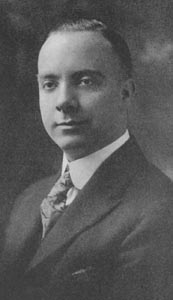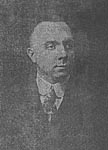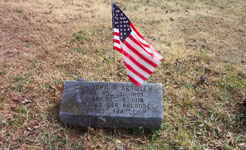

Remember...
John Morgan Brawley
1893-1918
"The battle is not to the strong alone; it is to the vigilant, the active, the brave."
Patrick Henry |
Remember...John Morgan Brawley
|
| John Morgan Brawley, son of David A. and Laura [Temple] Brawley, was born in Charleston, West Virginia, on August 31, 1893. David Brawley was the owner of a business that was located at 606 Kanawha Street in Charleston that sold stoves and home furnishings. The store was in business as early as 1883, and eventually became known as Brawley Brothers. After John graduated from high school, he went to work in the store as a clerk and was promoted to managing director in 1916. | 
|
John Brawley registered for the draft in June 1917 and was inducted into the service at Charleston on April 2, 1918. He went to Camp Lee, Virginia, for training and was assigned to Company B, 317th Infantry, 80th Division.
The 317th Infantry left Newport News, Virginia, for overseas duty on May 26, 1918, and arrived in France on June 9. They immediately began training with the British 3rd Army for combat duty on the front lines. John Brawley was promoted to the rank of Private 1st Class on July 3, 1918, and to Corporal on September 8, 1918.
Company B, 317th Infantry, and the 80th Infantry Division were assigned to the III Army at the start of the Meuse-Argonne Offensive, the largest American battle of World War I. The objective of this action was to capture the railroad hub at Sedan, which would break down the rail network supporting the German army in central France. The offensive lasted six weeks, from September 25 through November 11, 1918, and was divided into three phases.
The first phase, September 25-October 13, 1918, began with a heavy artillery barrage and by the end of September the AEF [American Expeditionary Forces] had captured the villages of Varennes and Montfaucon. The 317th Infantry and the 80th Infantry Division were positioned in the center of the battlefield near the Meuse River, where they were subjected to heavy artillery and suffered heavy losses. The movements of the AEF were slowed by the lack of passable roads in the Argonne area.
On the morning of October 4, 1918, John Brawley lost his life in battle. Lieutenant Tracy Campbell of Company B, 317th Infantry, wrote a letter to David Brawley about his son's fate:
On the night of October 3rd, we received orders to move from our position in the rear of Malencourt to a place in front of Sepharges [Hill 95]. On the morning of October 4th our battalion was in support at 5AM when the barrage opened up and lasted for 15 minutes. We moved forward to Mantillois and were moved over to the right to fill a gap in the front line. There was quite a bit of gas and shrapnel, but we suffered no casualties. After moving forward about 1,000 meters we were subjected to heavy machine gun fire and a few .595s. Every time the firing moderated, we would advance. Advancing was done by what we call "thin lines," which means one man at a time. It was during this procedure of advancing that Corporal Brawley was killed. He had just led his squad forward and was getting ready for another advance when death overtook him. He was shot through the heart, but while death was not instantaneous, he did not feel any pain, but continued the advance for about 10 yards. He was buried by the chaplain of the battalion on the spot where he fell with all the military honors possible under such circumstances. Corporal Brawley was well liked by members of his squad, and was what we term the life of his platoon. His loss was felt keenly by all who knew him. His actions and leadership under fire warranted him a sergeantcy if he had been able to accept the same.
On December 21, 1918, Captain P. Blair Lee of Company B, 317th Infantry, John Brawley's commanding officer, wrote a letter to Laura Brawley regarding her son:
I have always considered Corporal Brawley as one of the highest type of men, as well as soldier, and it has been a distinct privilege to have been associated with a man such as he - courageous and always devoted to his duty. He was an example and inspiration of the highest sort for his fellows. I recall very distinctly the period at which he joined the Company and the splendid progress he made at the very outset was largely due to the interest and undivided attention he gave his work. His popularity was unlimited and everyone regarded him as a true friend.
 |
Laura Brawley applied for and received a Victory Medal in John's name on April 28, 1921. On September 10, 1921, the body of John Brawley was returned to West Virginia, and re-buried in the Spring Hill Cemetery in Charleston with military honors. A road in the cemetery was named in his honor. |
In 1923, an American Legion post was formed on the west side of Charleston and was named John Brawley Post 61 in honor of John Morgan Brawley. Charleston already had one post, Kanawha Post 20, which had been formed in 1919. In 1925, it was decided that one large American Legion post would better benefit Charleston, so Post 20 and Post 61 were combined and named John Brawley Post 20. On November 16, 1925, a dedication was held at the Knights of Pythias hall on Charleston Street, with speeches made by Mayor W. W. Wertz and Governor Ephraim Morgan, as well as various veterans organizations.
At the time of his death, John Brawley was survived by his parents, David and Laura; his sisters Mary, Kathleen, and Julia; and his brothers Robert and Earl.

West Virginia Archives and History welcomes any additional information that can be provided about these veterans, including photographs, family names, letters and other relevant personal history.